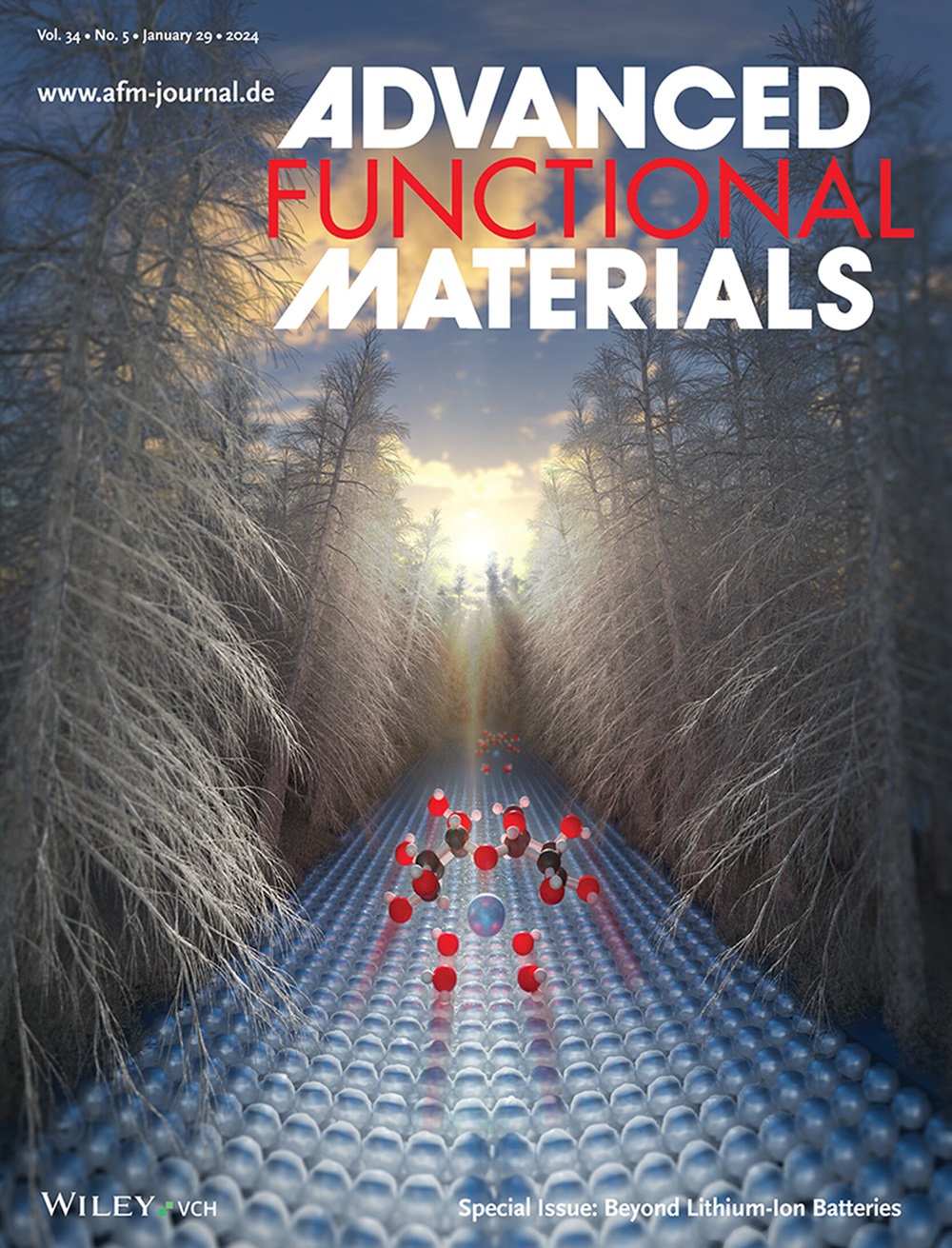Ultrafast Electron Dynamics at the P-rich Indium Phosphide/TiO2 Interface
IF 18.5
1区 材料科学
Q1 CHEMISTRY, MULTIDISCIPLINARY
引用次数: 0
Abstract
The current efficiency records for generating green hydrogen via solar water splitting are held by indium phosphide (InP)-based photo-absorbers, protected by TiO2 layers grown through atomic layer deposition (ALD). InP is also a leading material for photonic integrated circuits and computing, where ultrafast near-surface behavior is key. A previous study described electronic pathways at the phosphorus-rich (P-rich) surface of p-doped InP(100) using time-resolved two-photon photoemission (tr-2PPE) spectroscopy. Here, the intricate electron pathways of the P-rich InP surface modified with ALD-deposited TiO2 are explored. Photoexcited bulk InP electrons migrate through a bulk-to-surface transition cluster of states and surface states and inject into the TiO2 conduction band (CB). Energy levels and occupation dynamics of CB states in P-rich InP and TiO2 adlayers are observed, with discrete states preserved up to 10 nm TiO2 deposition. Thermalization lifetimes of excited electrons > 0.8 eV above the InP conduction band minimum (CBM) are preserved for layer thicknesses up to 2.5 nm. Annealing at 300 °C to achieve crystalline TiO2 reconstructions destroys interfacial states, affecting charge transfer. These observations enable innovative engineering of the P-rich InP/TiO2 heterointerface, opening new possibilities for studying hot-carrier extraction, adsorbate effects, surface plasmons, and improving photovoltaic and PEC water-splitting devices.

富磷铟/二氧化钛界面的超快电子动力学
目前,通过太阳能水分裂产生绿色氢气的效率记录由基于磷化铟(InP)的光吸收器保持,该吸收器由通过原子层沉积(ALD)生长的二氧化钛层保护。InP 也是光子集成电路和计算的主要材料,其中超快的近表面行为是关键。之前的一项研究利用时间分辨双光子光发射(tr-2PPE)光谱描述了掺杂 p 的 InP(100)富磷(P-rich)表面的电子路径。在此,我们探索了经 ALD 沉积 TiO2 修饰的富 P InP 表面错综复杂的电子通路。光激发的块状 InP 电子通过块状到表面的过渡态簇和表面态迁移并注入 TiO2 导带 (CB)。在富含 P 的 InP 和 TiO2 吸附层中观察到了 CB 态的能级和占据动态,离散态一直保留到 10 nm 的 TiO2 沉积。在厚度达 2.5 nm 的层中,激发电子的热化寿命比 InP 导带最小值(CBM)高出 0.8 eV。在 300 °C 下退火以实现晶体 TiO2 重构会破坏界面态,从而影响电荷转移。这些观察结果实现了富含 P 的 InP/TiO2 异质界面的创新工程,为研究热载流子萃取、吸附效应、表面等离子体以及改进光伏和 PEC 水分离器件提供了新的可能性。
本文章由计算机程序翻译,如有差异,请以英文原文为准。
求助全文
约1分钟内获得全文
求助全文
来源期刊

Advanced Functional Materials
工程技术-材料科学:综合
CiteScore
29.50
自引率
4.20%
发文量
2086
审稿时长
2.1 months
期刊介绍:
Firmly established as a top-tier materials science journal, Advanced Functional Materials reports breakthrough research in all aspects of materials science, including nanotechnology, chemistry, physics, and biology every week.
Advanced Functional Materials is known for its rapid and fair peer review, quality content, and high impact, making it the first choice of the international materials science community.
 求助内容:
求助内容: 应助结果提醒方式:
应助结果提醒方式:


